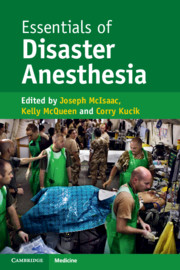Book contents
- Essentials of Disaster Anesthesia
- Essentials of Disaster Anesthesia
- Copyright page
- Contents
- Contributors
- Preface
- Disclaimer
- Chapter 1 Disaster Anesthesia
- Chapter 2 Preparing to Deploy to a Remote Disaster
- Chapter 3 Principles of Emergency and Trauma Surgery
- Chapter 4 Total Intravenous Anesthesia in Disaster Medicine
- Chapter 5 Inhaled Anesthetics and Draw-Over Devices in Disaster Response
- Chapter 6 Airway Management
- Chapter 7 Vascular Access, Hydration, and Fluids
- Chapter 8 Critical Care Delivery for Disasters in Austere Environments
- Chapter 9 Children in Disasters
- Chapter 10 Special Populations: Children
- Chapter 11 Laboratory Tests and Blood Banking
- Chapter 12 High-Altitude Physiology and Anesthesia
- Chapter 13 Disaster: Mental Health Effects, Responses, and What Clinicians Can Do
- Chapter 14 Considerations When Working with Children and Families
- Chapter 15 Chemical and Radiologic Exposures in Trauma and Disasters
- Chapter 16 Pain in Disasters
- Chapter 17 Radiology in the Austere or Disaster Environment
- Chapter 18 Communications
- Chapter 19 Security in Disaster Anesthesia
- Chapter 20 International Humanitarian Law
- Chapter 21 Operation Tomodachi: Anesthetic Implications
- Chapter 22 Austere Obstetric Anesthesia
- Chapter 23 Pharmacy in Disaster Anesthesia
- Chapter 24 Regional Anesthesia in Disaster Circumstances
- Chapter 25 Power and Light: Impact of Electrical Systems Failure on the Delivery of Anesthetic Care
- Book part
- Index
- References
Chapter 13 - Disaster: Mental Health Effects, Responses, and What Clinicians Can Do
Published online by Cambridge University Press: 23 June 2020
- Essentials of Disaster Anesthesia
- Essentials of Disaster Anesthesia
- Copyright page
- Contents
- Contributors
- Preface
- Disclaimer
- Chapter 1 Disaster Anesthesia
- Chapter 2 Preparing to Deploy to a Remote Disaster
- Chapter 3 Principles of Emergency and Trauma Surgery
- Chapter 4 Total Intravenous Anesthesia in Disaster Medicine
- Chapter 5 Inhaled Anesthetics and Draw-Over Devices in Disaster Response
- Chapter 6 Airway Management
- Chapter 7 Vascular Access, Hydration, and Fluids
- Chapter 8 Critical Care Delivery for Disasters in Austere Environments
- Chapter 9 Children in Disasters
- Chapter 10 Special Populations: Children
- Chapter 11 Laboratory Tests and Blood Banking
- Chapter 12 High-Altitude Physiology and Anesthesia
- Chapter 13 Disaster: Mental Health Effects, Responses, and What Clinicians Can Do
- Chapter 14 Considerations When Working with Children and Families
- Chapter 15 Chemical and Radiologic Exposures in Trauma and Disasters
- Chapter 16 Pain in Disasters
- Chapter 17 Radiology in the Austere or Disaster Environment
- Chapter 18 Communications
- Chapter 19 Security in Disaster Anesthesia
- Chapter 20 International Humanitarian Law
- Chapter 21 Operation Tomodachi: Anesthetic Implications
- Chapter 22 Austere Obstetric Anesthesia
- Chapter 23 Pharmacy in Disaster Anesthesia
- Chapter 24 Regional Anesthesia in Disaster Circumstances
- Chapter 25 Power and Light: Impact of Electrical Systems Failure on the Delivery of Anesthetic Care
- Book part
- Index
- References
Summary
Descriptions of disasters and their psychological impact as severe trauma on humans appear in ancient literature, such as Homer’s Iliad and Odyssey, and various religious texts. The historian Herodotus, in the sixth century BC, described a soldier who suffered from permanent blindness after he witnessed the death of a fellow soldier. More recently, soldiers who fought in the civil war suffered from a set of physical and emotional symptoms known as “Soldier’s Heart” or Da Costa’s syndrome, a possible predecessor of what we now refer to as post-traumatic stress disorder. While most disaster victims do not develop psychopathology, depending on the intensity and severity of the trauma, many survivors suffer from varying degrees of emotional problems. The common post-disaster psychiatric disorders are post-traumatic stress disorder (PTSD), major depression, and alcohol use disorder.1 Although disaster-related emotional traumas have been known for years, the clinical evaluation and treatment of these traumas within the disaster situation are relatively recent developments. Modern disaster psychiatry dates back to the 1942 “Cocoanut Grove” nightclub fire in Boston which killed 492 people and left a community in grief. Erich Lindeman,2 Stanley Cobb,3 and Alexander Adler4 published papers describing the psychiatric complications, symptomatology, and the management of acute grief related to this event.
- Type
- Chapter
- Information
- Essentials of Disaster Anesthesia , pp. 116 - 123Publisher: Cambridge University PressPrint publication year: 2020



